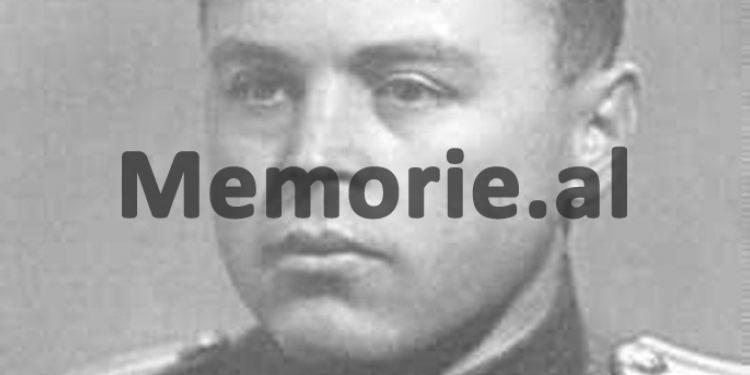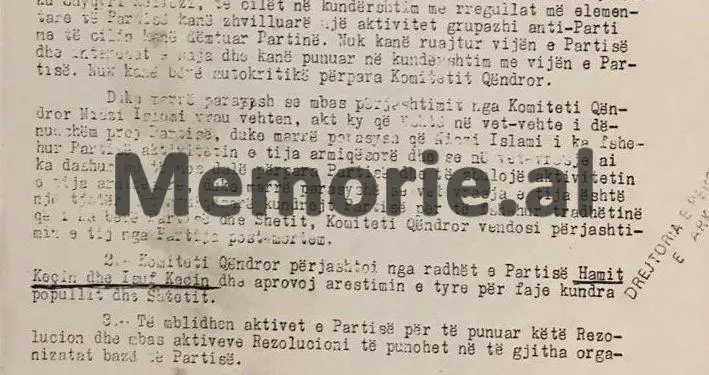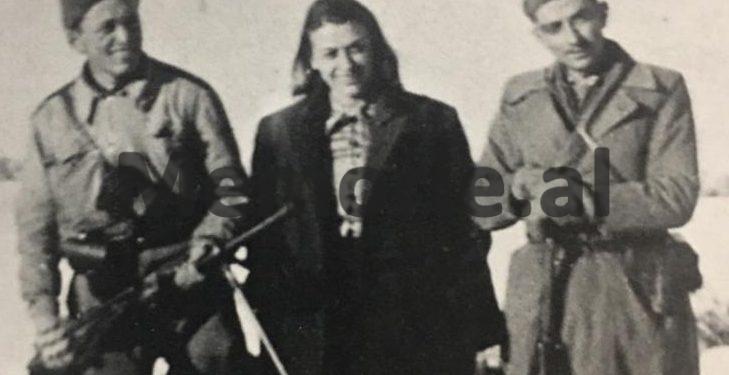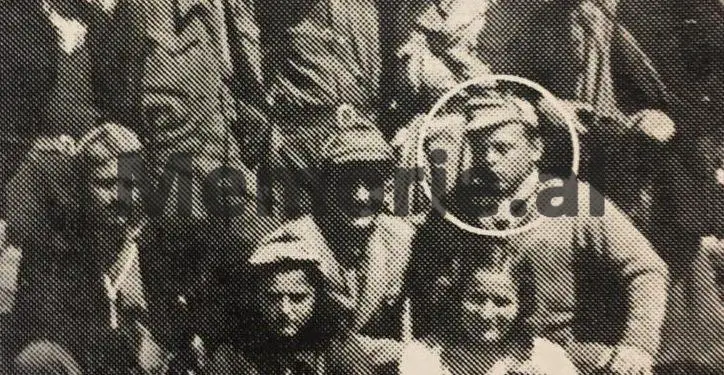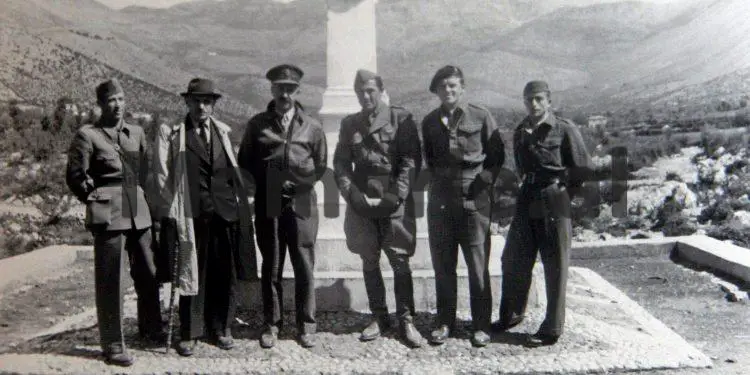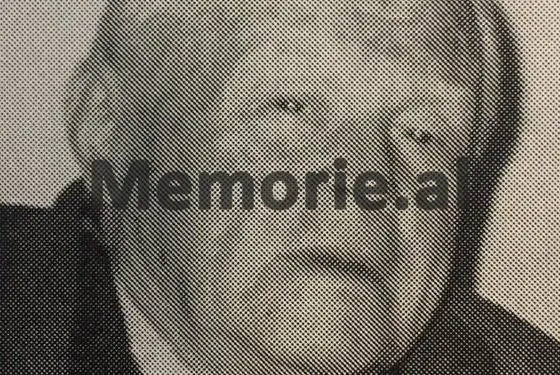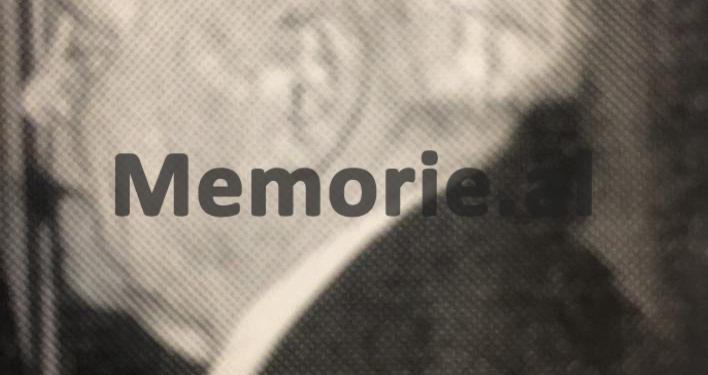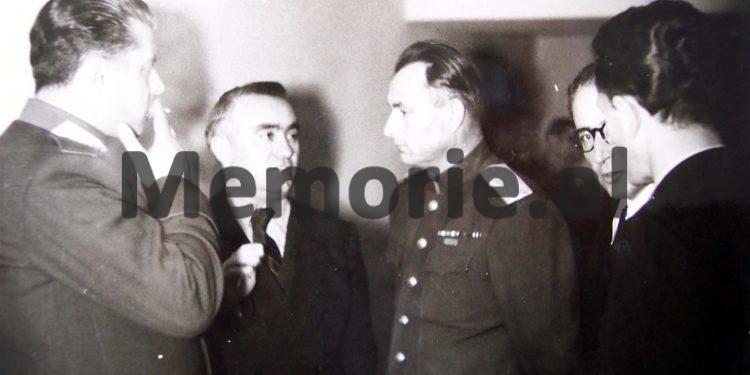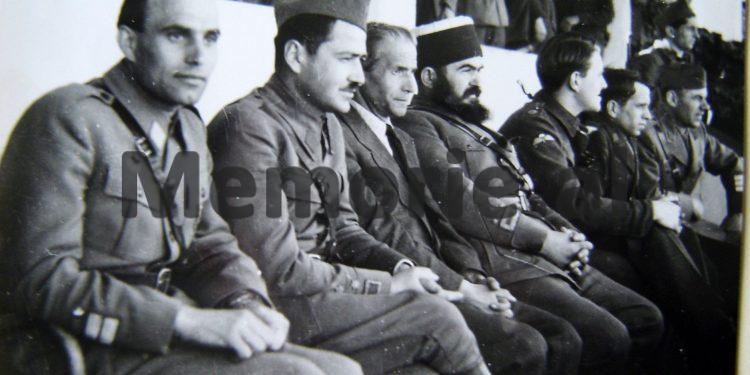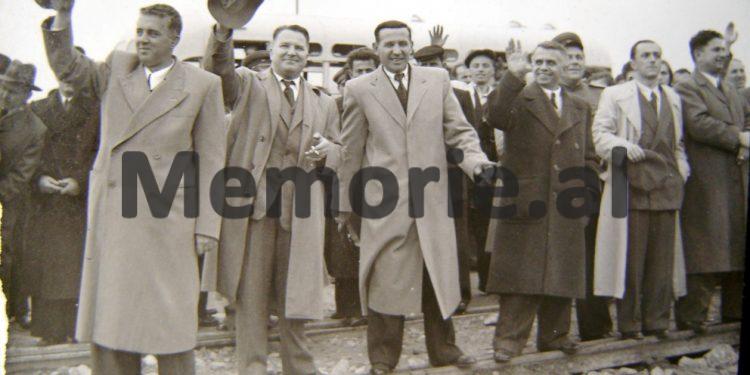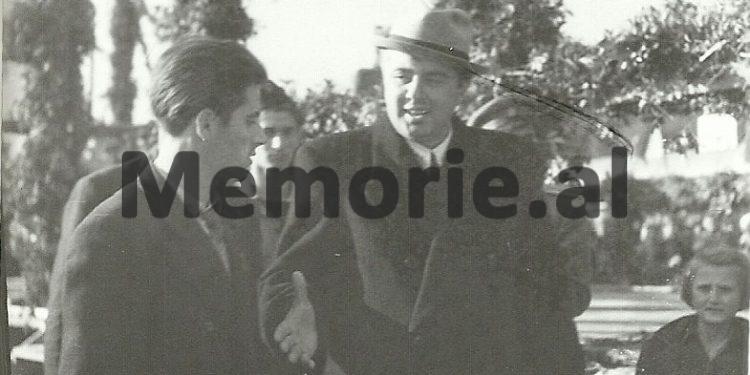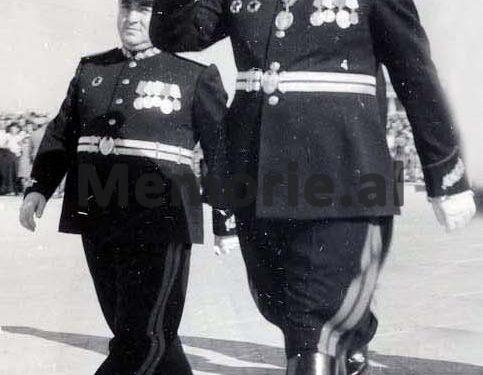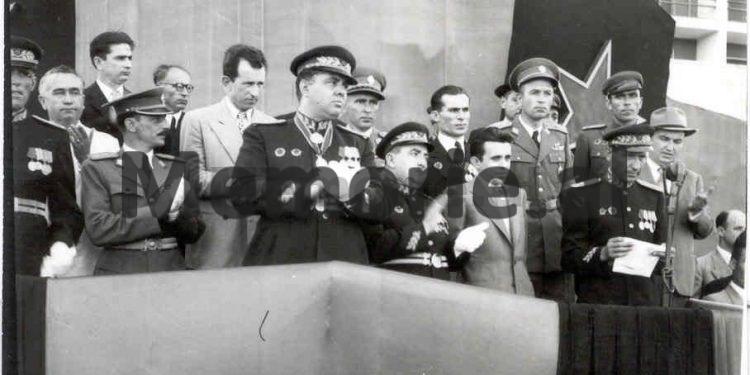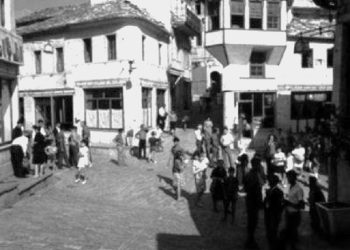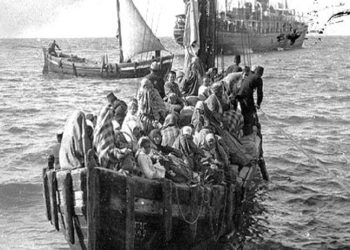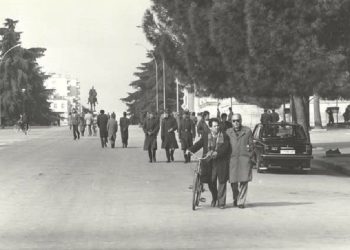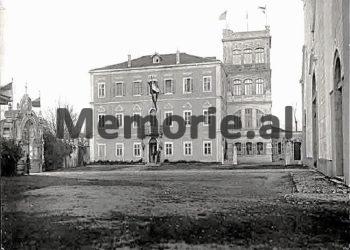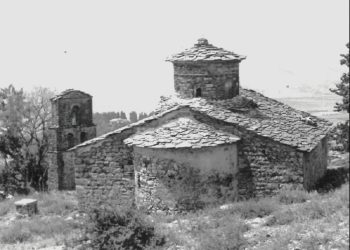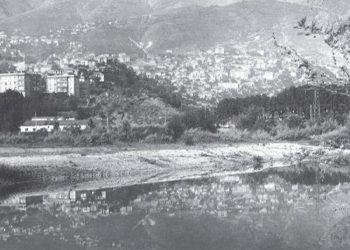Memorie.al publishes the unknown story of a group of members of the Central Committee of the ALP headed by: Njazi Islamit, Abedin Shehu, Shyqëri Këllezit, Isuf and Hamit Keçi, etc., who in 1950 when they held high positions also in the government and the army, as ministers and directors, etc., were attacked by Enver Hoxha and the Central Committee of the ALP, being accused that: with their hostile activity, they had neglected the Party and its political line, holding meetings regular as if they were a party forum and another government… ?!
For them, the economic plans of the state were “impossible”. Starting from distrust in the building forces of our people, being contrary to the Party line and wanting to sabotage the realization of the state economic plan, they showed distrust in the realization of the collection plan and other economic sectors and expected failure of these plans to strike at the Party and the state. They worried about the war being waged against the kulaks in the village and mourned them for the blows they suffered from the popular power. Military orders for them were controversial. They claimed that the compulsory execution of military orders is not fair. “The inferior,” they said, “should evaluate and discuss them, and, if he is not satisfied with their accuracy, should not apply them.” They did not have faith in the defense capability of our country and in the combat readiness of the People’s Army. They were informed about the defense capability of our country, about the combat readiness of the army and about other important military secrets. They ended their discussions convinced that the defense of our country is weak and the readiness of the army is not enough. They talked about organizational and staffing problems, such as the creation of new departments, changes of ministers, first district secretaries, etc. ” ALP held on February 20-22 and March 6, 1950, where the activity of the anti-party group led by: Abedin Shehu, Njazi Islami, Shyqëri Këllezit, Isuf and Hamit Keçi was analyzed and condemned”, Etc., who were later imprisoned and interned as enemies of the people. After the condemnation of the “Group of Deputies” in 1947 led by Shefqet Beja, Gjergj Kokoshi, Riza Danin, etc., who tried to come out and legalize the real opposition within the ranks of the Albanian Communist Party and the Democratic Front, “Anti-party group ”Within the ranks of the Central Committee of the ALP that was ousted by Enver Hoxha in 1950, was in fact a dissidence, or more precisely an opposition group, to the political line that that party was following. What were the functions of the members of this “anti-party group” and what was their activity? This is what this archival document is about, which Memorie.al is publishing in full, starting from this article.
Communication of the Central Committee on the activity of the “Anti-party group” headed by: Abedin Shehu, Njazi Islamit, Shyqëri Këllezit, Isuf e Hamit e Keçi, etc.
PLENUM V OF THE CENTRAL COMMITTEE OF ALP
Tirana, 20-22 February and 6 March 1950
COMMUNICATION FROM THE PLENUM OF THE CENTRAL COMMITTEE OF THE ALP
At its meeting on 20-22 February and 6 March 1950, the Central Committee decided to expel from its ranks the members of the Central Committee, Abedin Shehu, of Niazi Islami, who was also expelled from the Party and of the candidate of the Central Committee, Shyqri Këllezi, for anti-party and Trotskyist activity to the detriment of the interests of the Party, the people and the People’s Republic. It also decided to expel Nexhip Vincani from the ranks of the Central Committee, for serious mistakes and faults in his state and Party functions.
PLENUM OF THE CENTRAL COMMITTEE OF ALP
On February 20-22 and March 6, the Plenum V of the Central Committee of the ALP held its work under the chairmanship of the General Secretary of the Party, Comrade Enver Hoxha. The Plenum of the Central Committee heard the report of the General Secretary of the Party, Comrade Enver Hoxha, on the existence of an anti-party group and a group activity in the Party, which included the members of the Central Committee, Abedin Shehu, Niazi Islami and the candidate of the Committee. Central, Shyqri Këllezi and some other non-member elements of the Plenum of the Central Committee. After hearing the self-criticism of the above-mentioned comrades and analyzing the work of this anti-party group, the Plenum of the Central Committee concluded that there was a group and a group activity in the Party which included comrades: Abedin Shehu, Niazi Islami, members of the Central Committee. comrade Shyqri Këllezi, candidate of the Central Committee and Isuf Keçi and Hamit Keçi. This group, which carried out a dangerous activity for the Party and was condemned by it, would go to the faction and end up in open betrayal if the Central Committee and the Party had not been vigilant and had not detected it in time. . Experience shows that the group element and the anti-party end in betrayal and in the lap of imperialism. Following the letters of the Bolshevik Party, our Party discovered the Trotskyist group led by Koçi Xoxe, a group that was organized, assisted and supported by Tito-Rankovi etj, etc. The Trotskyist group of the traitor Koci Xoxe, like the Belgrade clique, aimed to degenerate the Party and transform it into a Trotskyist party in their hands, to degenerate the People’s Republic into a bourgeois republic, to tear our country and people from the camp of socialism, which gives the opportunity to build socialism in our country, to put our country in the lap of imperialism, for the realization of their imperialist and colonialist aspirations. In the light of the letters of the Bolshevik Party, the Trotskyist group of Koçi Xoxe and his activity were struck. Marxist-Leninist principles, democratic centralism, conscious and steely discipline, criticism and self-criticism, internal democracy and revolutionary vigilance were restored in the Party. After the discovery of Koçi Xoxa’s Trotskyist gang, the Central Committee and the Party had to strengthen their vigilance to guard the Party from any subsequent Trotskyist and hostile activity, to guard the Party ranks, and to purge these. This would be done in a continuous and daily struggle for the preservation of Marxist-Leninist principles, for the preservation of the organizational rules of the Party, for the strengthening of discipline, criticism and self-criticism, of internal democracy in the Party, in the struggle against the influence of Trotskyist activity and any show that harms the Party and its political, economic and organizational line. This right orientation was given by the 1st Congress of the Party, the Central Committee and our Party. The experience of the Bolshevik Party was a strong support for a fair orientation of work and vigilance for maintaining and strengthening the ranks of the Party, and at the same time our Party had its own experience in the fight against groups and factions, such as he of traitors Sadik Premte and Anastas Lula, leaders of the “Youth” group. Our party was born of communist groups. The element of the “Youth” group, like the element of all other groups, entered the ranks of the Party. The leaders of the “Youth” group, the traitors Sadik Premte and Anastas Lula, were against the formation of the Party and its political and organizational line. These Trotskyist leaders had formed a group with anti-party and anti-Marxist-Leninist concepts. Having no faith in the masses of the people, in the working class and in its avant-garde role, they had nothing to do with them, ignored them and stayed away from them. Their work was a Trotskyist-fascist work covered in leftist slogans. They oriented members towards crimes. Their conception of morality was at odds with proletarian morality. Trotskyists Anastas Lula and Sadik Premte educated the group with a rotten conspiracy and a form of anti-party organization using close circles of acquaintances, friends and relatives, which are a direct result of distrust of the masses. After the formation of the Party, the Trotskyists and fascists Anastas Lula and Sadik Premte, threw themselves into open warfare against the Party. The party crushed these traitors. With the careful work of the Party, most of the sound element of this group was educated by the Party and became loyal to it. Another part of this group, which was more under the influence of the leaders, ideology and anti-party conceptions of the group, preserved and developed the moral, social, organizational and ideo-political conceptions of the group. This unhealthy part of this group has been constantly at odds with the Party and its line, has made significant zigzags at work, but has not been able to come out openly in the fight against the Party, because of its successes and revolutionary momentum. The party. This part of the “Youth” group, which included Abedin Shehu, Shyqri Këllezi, Isuf Keçi and Hamit Keçi and was joined by Niazi Islami, who had the same anti-party concepts, was always waiting for events and of crises in the Party to take advantage of situations. Plenum VIII was one of these events. They showed solidarity with the platform of the Plenum VIII Resolution, not from the positions of the Party, but from their anti-party positions; came out as persecuted and at the same time became persecutors. Not only were they not hit by the Trotskyist leader Koçi Xoxe, but they would have met him in the war against the Party if the Trotskyist group of Koçi Xoxe had not been discovered. Plenum XI was another event in the Party for the anti-party purposes of Abedin Shehu, Niazi Islami, Shygri Këllez, Isuf Keçi and Hamit Keçi. The XI Plenum was an important turning point in our Party in light of the Bolshevik Party’s bailout letters to the leadership of the Yugoslav Communist Party. All the work of the Party and the people were reviewed in the spirit of a sound critique and self-criticism. Only the Trotskyists, the “district” that included Abedin Shehu, Niazi Islami, Shyqri Këllezi, Isuf Keçi, Hamit Keçi and the other weak element did not do so. This “circle of friends” did not speak openly to the Party this time either, did not reconsider their mistakes and distorted views of the Party. They remained in their anti-party positions and lied to the Party at a time when it, quite rightly, was reviewing the mistakes made and the sentences given in the Trotskyist line, when it was changing its views towards the cadre to ensure, thus, the definitive destruction of the effect of Trotskyist activity on cadre policy and on cadre. In the aftermath of these events and in the First Party Congress and during the congress, they set themselves the goal of taking positions in the Party taking advantage of the situation. For this they prepared and made a plan: in the grassroots organizations, in the conferences for the election of delegates to the congress and in the congress, they hid not only their anti-party views and their mistakes, but also those of each other, being removed as persecuted removed any suspicion against them; advertised each other, criticized those who in their view should not be in the new leadership, and, in flagrant violation of congressionally approved regulations, made lists of candidates for leadership outside the congressional election commission. Abedin Shehu, who was a member of this commission, deconstructed the discussions of the election commission in his group members. The Congress became for these comrades a turn in the direction and with the opposite purpose to that of the Party. They took up positions in the Party and in the state and began to regroup and develop concrete group work and move from “free social” ties to organizational group ties. Thus, from the “friendly” ties maintained by the “Youth” group, they ended up creating an anti-party group in the ranks of the Party with organizational, political and moral features of the old “Youth” group. In this way, having group views on the Party, distrusting the Party and being at odds with it and its line, they passed to a more organized phase of their struggle against the Party and precisely at a time when they strengthened their positions in the leadership of the Party and the state.
CHARACTERISTICS AND ACTIVITY ANTIPARTY OF THE GROUP Led by ABEDIN SHEHU, NIAZI ISLAMI, SHYQRI KËLEZI, ISUF KEÇI AND HAMIT KEÇI
This «circle of friends- and their work has all the characteristics of an anti-party group and group work.
- The group met almost regularly. Meetings were generally held with the same people: Abedin Shehu, Niazi Islami, Shyqri Këllezi, Isuf Keçi, Hamit Keçi who were the main “friends”.
- In these meetings they discussed issues that they feared and did not want to discuss in the Party and in other state bodies, and criticized everything and anyone, outside the Party rules.
- These meetings discussed political, economic, social, military, organizational and cadre issues as if it were a party forum (as they themselves have claimed) or another government.
- Discussions on political, economic, social, military, organizational and personnel problems took place on anti-party, anti-socialist and anti-popular grounds. They underestimated the history of our people, the revolutionary forces of the people, the working class and the National Liberation War. For them, Skanderbeg was not the Hero of our Nation who withstood for 24 years the repeated attacks of the Ottomans ensuring the independence of our people, but a “nothing and the history of Albania for them is a” fairy tale “; our people who won the admiration of the whole world with their resistance against fascism since the first days of April and with his National Liberation War, they accused him of being a “mistrec” people. According to the views of this group, there is no working class in Albania. Our workers “do not deserve” this name?! According to the wrong views and anti-party of this group the economic policy of the Party and of our government was not right. According to them, the free state market was not in the interest of the state and the working masses, but “in the interest of the rich”
To them, the state’s economic plans were “unachievable.” Starting from distrust in the building forces of our people, being contrary to the Party line and wanting to sabotage the realization of the state economic plan, they showed distrust in the realization of the collection plan and other economic sectors and expected failure of these plans to strike at the Party and the state. They worried about the war being waged against the kulaks in the village and mourned them for the blows they suffered from the popular power. Military orders for them were controversial. They claimed that the compulsory execution of military orders is not fair. “The inferior,” they said, “should evaluate and discuss them, and, if he is not satisfied with their accuracy, should not apply them.” They did not have faith in the defense capability of our country and in the combat readiness of the People’s Army. They were informed about the defense capability of our country, about the combat readiness of the army and about other important military secrets. They ended their discussions convinced that the defense of our country is weak and the readiness of the army is not enough. They talked about organizational and staffing problems, such as the creation of new departments, changes of ministers, first district secretaries, etc.
- In these meetings conclusions were reached and based on these conclusions, from the group position, a position was held on party and state work. On various occasions they have made proposals, remarks and held positions on political, economic and organizational issues in government, committees, etc., which have previously been discussed and agreed between them. Thus, after the group talks, they remarked that the state free market policy is not right, that the plans cannot be realized if they are not ready and have not been “perfectly” filled with material, transport, power. workers, etc. », that the plans are unreal, etc. While when the decision was made on these issues by the Central Committee and the government, they did not make such remarks. From the group positions they have come up with proposals for the creation of new departments and have sabotaged the organization of administrative bodies, based on decisions taken and based on Soviet experience.
- This group work was reflected in the work of members outside the group. In their work outside the group, disobedience, opposition to orders and breaking of decisions have been seen. They have refused, as military men, to obey the orders of the Command, to flagrantly break the military subordination, and to accuse the game command of treason during a military game; have refused to obey government orders to cooperate with ministers in resolving state problems; have broken the decisions taken in the leadership for the preparation of organic organs of state bodies and have come up with projects contrary to these decisions. They did not respect the laws of the state. Contrary to the government’s decision they have kept in force and implemented abrogated ordinances. In their work outside the group is seen the spread of the demobilizing spirit in the realization of the plan and its sabotage, defeat and disorganization, carelessness, the absolute absence of which against the work of enemies and sabotage, breaking the discipline and hierarchy of the state and the Party and the saboteurs, agents and spies of the yugoslavs were praised and decorated. Despite the remarks made from time to time by the leadership of the Party and the state on the hostile work that took place in their sectors, they have continued to defend this work, causing great damage to the state either with sabotage or with the non-implementation of the plan. of the state as e.g. in traffic, in Kuçova etc. The megalomania and ambition that nurtured in their group manifested itself in the contempt for the work of other sectors, in the contempt for the leaders of other sectors, in the advertising of themselves and their work. The distrust of the group in the working class and the degeneration of the working conscience within their ranks manifested itself in the misuse of the workshop, both in Patos and elsewhere. Due to their anti-Sovietism, they did not cooperate with Soviet advisers, did not listen to their valuable advice for a better organization of work, for the application of new methods to increase production, for the realization of plans, and so on. They tried to get away from the control and leadership of the Party. For them, the Party committees should not have the right to make the personnel policy in the work centers, to see the draft plans and the realization of the plans, to express their opinion and to help. They wanted a dictatorial direction (according to their expression), a personal direction of the labor sectors they headed.
- Each member directly or indirectly deconstructed in a group all the state secrets of which he was aware. Important state secrets regarding our foreign relations have been deconstructed here; secrets of the economy, such as figures, project studies not yet submitted to the government, etc., military secrets of security and defense of our country, etc. The members of the Plenum of the Central Committee, Abedin Shehu, Niazi Islami and Shyqri KëIlezi, not only did not take a stand, but also deconstructed these state and Party secrets and forced others to deconstruct by asking for information.
- A center had begun to be established in which the authority of some, and especially of Abedin Shehu, was discernible. They were asked questions, talked to, asked for their opinion on state and party issues. The press of the Party and the organizations was not read and the internal and external political situation was taken by the group.
- The group conspiracy had taken place. No one informed the Party and the government and they kept to the revolutionary vigilance of the Party. The party has never been in the news, neither for meetings nor for the declassification of state secrets, nor for the wrong views and objections to the Party line, which were manifested within the group.
- They defended and boasted to each other and hid in front of the Party the mistakes and faults of themselves and their group mates.
- They worked to expand their circle with comrades who held positions in the Party and in the state, and used for this the method of provocation and compromise to the element which they thought might have been a reason to be dissatisfied or which they wished to arouse. dissatisfaction./Memorie.al
Continues tomorrow




